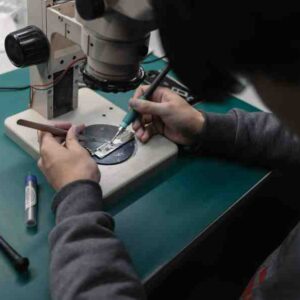
Table of Contents
Introduction
In the race for medical advancements, breakthroughs often come with a price. This is the case with Tepezza, a medication hailed as a breakthrough treatment for Thyroid Eye Disease (TED). While the drug offers promising relief for TED sufferers, a growing number of lawsuits raise concerns about its potential side effects.
This article discusses the Tepezza lawsuit. We’ll explore the claims against the manufacturer and the questions they raise about patient safety and informed consent.
The Struggle and a Hopeful Arrival
Thyroid Eye Disease, also known as TED or Graves’ ophthalmopathy, is an autoimmune disorder affecting the eye socket.
According to the National Institutes of Health (NIH), TED is more prevalent in women. The estimated annual incidence is 16 per 100,000 compared to 3 per 100,000 in men. While the disease typically presents mildly and may even resolve independently, it can become sight-threatening in 3-5% of cases.
TED progresses through distinct phases. Inflammation, swelling, and tissue changes in the eye socket characterize the initial active phase. This can lead to various uncomfortable and potentially vision-impairing symptoms, including bulging eyes, gritty sensation, eyelid retraction, light sensitivity, and double vision. The active phase eventually gives way to an inactive phase, where the disease progression stops.
For many TED sufferers, managing the disease has historically been a complex process involving various medications, steroid injections, and even surgery. This is where Tepezza enters the picture.
Approved by the FDA in early 2020, the drug quickly became Horizon Therapeutics’ top-selling drug. Amgen later acquired it in a substantial acquisition deal. Marketed for its efficacy in reducing inflammation and proptosis (eye bulging), the drug’s success is underscored by substantial sales figures.
While Tepezza offers a promising new approach, recent legal developments raise questions about the potential price of progress.
The Lawsuit and its Claims
At the heart of the Tepezza lawsuit lies a critical allegation. The manufacturer allegedly neglected to adequately warn patients and doctors about the risk of hearing loss associated with the treatment.
According to Forbes, numerous patients who used the drug reported experiencing serious hearing complications, including tinnitus and hearing impairment. These lawsuits allege that the manufacturer did not adequately warn patients or doctors about the likelihood of hearing-related side effects. Additionally, they did not disclose the potential for these issues to be severe or even permanent.
Adding weight to these concerns is the fact that the manufacturer only added a warning label to the medication in 2023. The label states the risk of “severe hearing impairment including hearing loss, which in some cases may be permanent.”
TorHoerman Law notes that this warning comes too late for many patients. Some had already received Tepezza before this update, and they experienced hearing problems soon after the drug’s FDA approval in early 2020.
Exploring the Potential Risks
The lawsuit highlights a potential side effect with life-altering consequences: hearing loss and tinnitus. While the exact cause-and-effect relationship is under investigation in ongoing legal proceedings, numerous cases highlight the impact this side effect can have on patients.
Lawsuit Information Center details a case in Florida where a man diagnosed with TED received Tepezza infusions. Neither he nor his doctors were informed about the potential for permanent hearing loss or tinnitus. Unfortunately, after the treatment period, the man began experiencing these issues, suggesting a possible link to the drug.
Hearing loss can range from mild to profound. It may impact a person’s ability to understand speech, follow conversations, and appreciate sounds in their environment. Tinnitus, or ringing in the ears, can be a constant and debilitating presence, disrupting sleep and concentration. For some, these effects can be temporary, while for others, they may be permanent.
The ongoing multidistrict litigation (MDL) involving Tepezza underscores the severity and complexity of these issues. The outcomes of these trials will likely set precedents for subsequent cases. It will influence future treatment protocols, patient education, and regulatory oversight surrounding Tepezza and similar medications.
The Price of Progress
The lawsuit raises a crucial question: Do the drug’s potential benefits outweigh the potential risks, particularly concerning hearing loss?
Tepezza offers a significant advancement in TED treatment. Unlike traditional options focusing on managing inflammation, the drug has shown promise in reducing eye bulging and potentially improving vision. This can be life-changing for TED sufferers, alleviating physical discomfort and potentially restoring confidence.
However, the specter of permanent hearing loss cannot be ignored. The lawsuits highlight the potential severity of this side effect, raising concerns about the long-term impact on patients’ quality of life.
The challenge lies in finding the right balance. While the drug may offer a better solution than existing treatments, the possibility of permanent hearing loss demands careful consideration.
Are there alternative options? The answer is yes, but they may not be as effective. According to Fierce Biotech, Innovent Biologics’ IBI311, another drug targeting TED, showed promising results in reducing eye protrusion in clinical trials.
This candidate targets the insulin-like growth factor 1 receptor (IGF-1R), similar to Tepezza, positioning it as a potential competitor in the treatment market. However, it’s still developing, and its long-term safety profile, including potential hearing risks, remains unknown.
Frequently Asked Questions
What is the success rate of Tepezza?
In clinical studies, Tepezza showed a success rate where seven to eight out of 10 patients experienced reduced eye bulging after completing treatment. Additionally, five out of 10 patients reported improvement in double vision following the full course of treatment.
Is hearing loss from Tepezza permanent?
Hearing loss from the drug can be permanent, as reported in lawsuits and adverse event reports. Patients have alleged permanent hearing impairment and tinnitus following treatment. Ongoing litigation and regulatory scrutiny are examining these claims to determine the extent and long-term implications of Tepezza-related hearing issues.
Has anyone experienced a reversal of hearing loss?
Reversing hearing loss, particularly linked to Tepezza, has not been widely reported. While some treatments and interventions may manage symptoms, permanent hearing loss cases associated with the drug have typically not shown full recovery.
In conclusion, while Tepezza offers a potential path to relief for TED sufferers, the risk of permanent hearing loss cannot be taken lightly. The upcoming legal battles will likely shed more light on the extent of this risk and the manufacturer’s responsibility.
This case highlights the importance of informed consent in healthcare. Patients deserve to be fully aware of all potential side effects, especially those as life-altering as hearing loss. Open communication between patients and doctors is crucial for making informed treatment decisions.
The future of TED treatment lies in striking a balance. We need medications that are effective in managing TED symptoms and have minimal side effects. New advancements will offer even better options for patients, allowing them to reclaim their quality of life without fearing losing their hearing.
You can read our latest post


